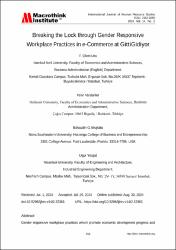Breaking the lock through gender responsive workplace practices in e-commerce at GittiGidiyor

View/
Access
info:eu-repo/semantics/openAccesshttp://creativecommons.org/licenses/by/3.0/us/Date
2024Metadata
Show full item recordAbstract
Gender responsive workplace practices which promote economic development progress and lead to a more sustainable future for the work life are on the agenda globally.
Notwithstanding that the importance and promotion of gender responsive workplace practices
has been recognized and accelerated in recent years; these practices have not reached the
desired level worldwide yet. Thus, it is important to share and increase the number of best
practices that businesses should perform on gender equality. Considering the importance of
this subject, in the literature, gender responsive workplace practices have not been adequately
addressed, especially in developing countries. To fill this gap in the field, in this study, we
aim to reveal gender responsive workplace practices by opening a new door on this issue
while grounding the subject on the New Institutional Theory and Feminist Institutionalist
Paradigm at the macro level, and on the Strategic Human Resources Management (SHRM)
and its sub-branch Diversity and Equality Management Systems (DEMS) at the micro level.
Hence, we explain this issue by analyzing it in-depth via a case study in leading gender
responsive workplace practices in the context of a developing country, Turkey. The results
indicate that gender responsive workplace practices are put into practice by following
acquiesce strategy and with SHRM and DEMS.
Source
International Journal of Human Resource StudiesVolume
14Issue
2Collections
The following license files are associated with this item:


















